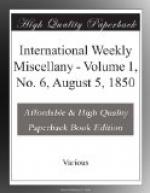* * * * *
[FROM HOUSEHOLD WORDS.]
THE SERF OF POBEREZE.
The materials for the following tale were furnished to the writer while traveling last year near the spot on which the events it narrates took place. It is intended to convey a notion of some of the phases of Polish, or rather Russian serfdom (for, as truly explained by one of the characters in a succeeding page, it is Russian), and of the catastrophes it has occasioned, not only in Catherine’s time, but occasionally at the present. The Polish nobles—themselves in slavery—earnestly desire the emancipation of their serfs, which Russian domination forbids.
The small town of Pobereze stands at the foot of a stony mountain, watered by numerous springs in the district of Podolia, in Poland. It consists of a mass of miserable Cabins, with a Catholic chapel and two Greek churches in the midst, the latter distinguished by their gilded towers. On one side of the market-place stands the only inn, and on the opposite side are several shops, from whose doors and windows look out several dirtily dressed Jews. At a little distance, on a hill covered with vines and fruit-trees, stands the Palace, which does not, perhaps, exactly merit such an appellation, but who would dare to call otherwise the dwelling of the lord of the domain?
On the morning when our tale opens, there had issued from this palace the common enough command to the superintendent of the estate, to furnish the master with a couple of strong boys, for service in the stables, and a young girl to be employed in the wardrobe. Accordingly, a number of the best-looking young peasants of Olgogrod assembled in the avenue leading to the palace. Some were accompanied by their sorrowful and weeping parents, in all of whose hearts, however, rose the faint whispered hope, “Perhaps it will not be my child they will choose!”
Being brought into the court-yard of the palace, the Count Roszynski, with the several members of his family, had come out to pass in review his growing subjects. He was a small and insignificant-looking man, about fifty years of age, with deep-set eyes and overhanging brows. His wife, who was nearly of the same age, was immensely stout, with a vulgar face and a loud, disagreeable voice. She made herself ridiculous in endeavoring to imitate the manners and bearing of the aristocracy, into whose sphere she and her husband were determined to force themselves, in spite of the humbleness of their origin. The father of the “Right-Honorable” Count Roszynski was a valet, who, having been a great favorite with his master, amassed sufficient money to enable his son, who inherited it, to purchase the extensive estate of Olgogrod, and with it the sole proprietorship of 1600 human beings. Over them he had complete control; and, when maddened by oppression, if they dared resent, woe unto them! They could be thrust into a noisome dungeon, and chained by one hand from the light of day for years, until their very existence was forgotten by all except the jailor who brought daily their pitcher of water and morsel of dry bread.




